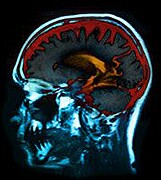- Could Your Grocery Store Meat Be Causing Recurring UTIs?
- Are You Making This Expensive Thermostat Error This Winter?
- Recognizing the Signs of Hypothyroidism
- 10 Strategies to Overcome Insomnia
- Could Artificial Sweeteners Be Aging the Brain Faster?
- Techniques for Soothing Your Nervous System
- Does the Water in Your House Smell Funny? Here’s Why
- Can a Daily Dose of Apple Cider Vinegar Actually Aid Weight Loss?
- 6 Health Beverages That Can Actually Spike Your Blood Sugar
- Treatment Options for Social Anxiety Disorder
Brains of Teens With Bipolar Disorder Develop Differently: Study


Teens with bipolar disorder seem to have abnormal development in areas of the brain that help regulate emotions, researchers report.
“In adolescence, the brain is very plastic so the hope is that one day we can develop interventions to prevent the development of bipolar disorder,” senior study author Hilary Blumberg, a professor of psychiatry, diagnostic radiology, and of psychiatric neuroscience at the Yale Child Study Center in New Haven, Conn., said in a university news release.
Bipolar disorder typically appears in the teens and causes severe swings in mood, energy and activity levels. Problems with impulse control are common among people with bipolar disorder. People with bipolar disorder are also at high risk for substance abuse and suicide, the researchers said.
Over two years, the Yale School of Medicine team conducted a series of MRI scans on 37 teens with bipolar disorder and a control group of 35 teens without the condition.
In normal development, teens tend to lose gray matter (neurons) and add white matter connections. But compared to the control group, teens with bipolar disorder lost more gray matter and had no increase in white matter connections. These differences were seen in two areas of the brain.
The findings suggest that brain circuits that regulate emotions develop differently in teens with bipolar disorder, according to the authors of the study.
The study was published recently in the journal Biological Psychiatry.
More information
The U.S. National Institute of Mental Health has more about bipolar disorder.
Source: HealthDay
Copyright © 2026 HealthDay. All rights reserved.










